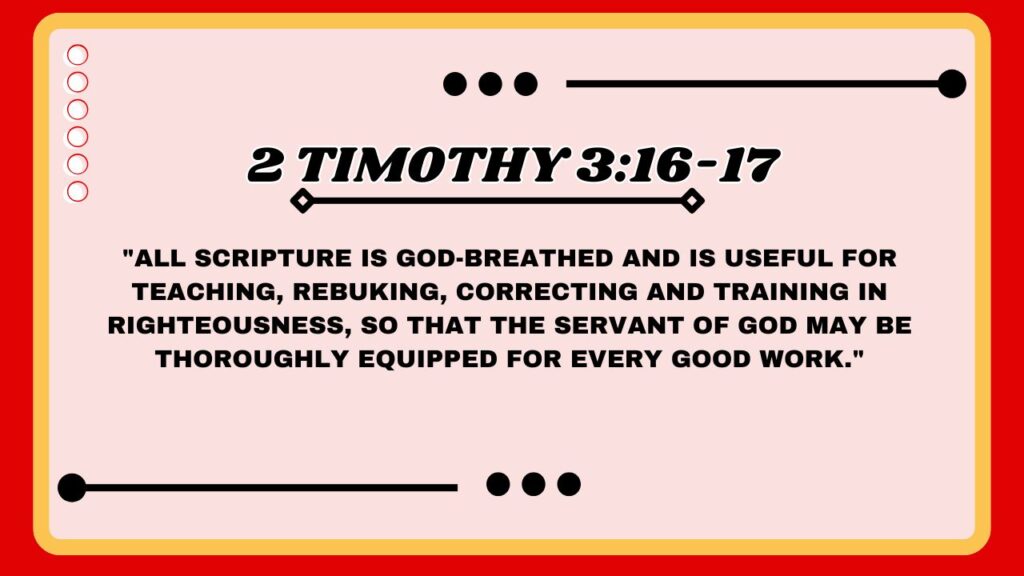Bible Verses About Being Set Apart: In a world that constantly pulls us toward conformity, Scripture reminds us that followers of Christ are called to be different to be set apart. This sacred distinction isn’t about isolation but about living with divine purpose and holy character in the midst of a broken world.
Being set apart, or sanctified, is a cornerstone of Christian identity. It means being chosen by God for a special purpose, living according to His standards rather than the world’s, and reflecting His character in everything we do.
The Bible speaks abundantly about this concept, showing us that being set apart isn’t just a religious idea it’s a transformative way of life that shapes our choices, relationships, and purpose.
What It Means to Be Holy and Set Apart
1. Leviticus 20:26
“You are to be holy to me because I, the LORD, am holy, and I have set you apart from the nations to be my own.”
This foundational verse establishes God’s desire for His people to reflect His holy nature. Holiness isn’t simply about moral behavior but about belonging exclusively to God. We can embrace this identity by regularly reminding ourselves whose we are and living accordingly.
2. 1 Peter 2:9
“But you are a chosen people, a royal priesthood, a holy nation, God’s special possession, that you may declare the praises of him who called you out of darkness into his wonderful light.”

Peter emphasizes our collective identity as God’s chosen people. This verse reminds us that being set apart comes with both privilege and purpose to proclaim God’s excellence. We fulfill this calling when we intentionally share our testimony of God’s transforming work in our lives.
3. John 17:16-17
“They are not of the world, even as I am not of it. Sanctify them by the truth; your word is truth.”
In Jesus’ prayer, He acknowledges that believers live in the world but aren’t defined by worldly values. Sanctification happens through God’s truth. We participate in this process by immersing ourselves in Scripture and allowing it to reshape our thinking and priorities.
4. Romans 12:2
“Do not conform to the pattern of this world, but be transformed by the renewing of your mind. Then you will be able to test and approve what God’s will is his good, pleasing and perfect will.”
Paul calls believers to resist cultural pressures and embrace transformation through renewed thinking. This verse shows that being set apart begins internally. Start by identifying one area where your thinking needs renewal and intentionally align it with God’s perspective.
5. 2 Corinthians 6:17
“Therefore, ‘Come out from them and be separate,’ says the Lord. ‘Touch no unclean thing, and I will receive you.'”
This verse calls for intentional separation from sinful influences. Being set apart requires making sometimes difficult choices about our associations and activities. Consider what relationships or habits might be compromising your distinctive witness.
Called to Distinctive Living
6. Ephesians 5:8-10
“For you were once darkness, but now you are light in the Lord. Live as children of light (for the fruit of the light consists in all goodness, righteousness and truth) and find out what pleases the Lord.”
Paul contrasts our former state with our new identity as “children of light.” This verse emphasizes that being set apart is visible through virtuous living. Seek to embody goodness, righteousness, and truth in your daily interactions as a testimony to your transformed nature.
7. 1 Thessalonians 4:3-7
“It is God’s will that you should be sanctified: that you should avoid sexual immorality; that each of you should learn to control your own body in a way that is holy and honorable… For God did not call us to be impure, but to live a holy life.”
This passage specifically addresses sexual purity as an aspect of sanctification. It reminds us that our bodies belong to God and should be used accordingly. Honor God by establishing clear boundaries in your romantic relationships and media consumption.
8. Titus 2:11-14
“For the grace of God has appeared that offers salvation to all people. It teaches us to say ‘No’ to ungodliness and worldly passions, and to live self-controlled, upright and godly lives in this present age, while we wait for the blessed hope the appearing of the glory of our great God and Savior, Jesus Christ, who gave himself for us to redeem us from all wickedness and to purify for himself a people that are his very own, eager to do what is good.”
Paul explains how God’s grace motivates and enables holy living. This verse connects our present conduct with our future hope in Christ. Let gratitude for salvation fuel your commitment to distinctive living, especially when temptation feels strong.
9. Philippians 2:14-15
“Do everything without grumbling or arguing, so that you may become blameless and pure, ‘children of God without fault in a warped and crooked generation.’ Then you will shine among them like stars in the sky.”

Even our attitudes set us apart in a complaining world. When we choose gratitude over grumbling, we shine distinctively. Practice replacing complaints with expressions of thankfulness, becoming a refreshing presence in negative environments.
10. Matthew 5:13-16
“You are the salt of the earth… You are the light of the world. A town built on a hill cannot be hidden… let your light shine before others, that they may see your good deeds and glorify your Father in heaven.”
Jesus uses metaphors of salt and light to illustrate our distinctive influence. Being set apart isn’t for isolation but for transformation. Identify specific ways your actions can bring positive flavor and illumination to your workplace, neighborhood, or family.
Set Apart Through Divine Selection
11. Deuteronomy 7:6
“For you are a people holy to the LORD your God. The LORD your God has chosen you out of all the peoples on the face of the earth to be his people, his treasured possession.”
This verse emphasizes Israel’s special selection by God. Similarly, believers today are chosen not because of merit but because of God’s sovereign love. Let this truth of divine selection cultivate humility and gratitude rather than pride or entitlement.
12. Jeremiah 1:5
“Before I formed you in the womb I knew you, before you were born I set you apart; I appointed you as a prophet to the nations.”
Though spoken specifically to Jeremiah, this verse reveals God’s intentional design in each life. Being set apart begins with God’s foreknowledge and purpose. Reflect on how your unique gifts, experiences, and passions might reveal God’s specific calling for your life.
13. John 15:16
“You did not choose me, but I chose you and appointed you so that you might go and bear fruit fruit that will last and so that whatever you ask in my name the Father will give you.”
Jesus reminds disciples that divine selection comes with purpose lasting fruitfulness. Being chosen means being commissioned for meaningful service. Consider what “fruit” God might want to produce through your life, and surrender to His productive work.
14. Ephesians 1:4-5
“For he chose us in him before the creation of the world to be holy and blameless in his sight. In love he predestined us for adoption to sonship through Jesus Christ, in accordance with his pleasure and will.”
Paul reveals the ancient origins of our set-apart status before creation itself. This verse roots our identity in God’s eternal love and adoptive grace. Allow this profound truth to anchor your self-worth in God’s choice rather than in others’ approval.
15. 1 Corinthians 1:26-29
“Brothers and sisters, think of what you were when you were called. Not many of you were wise by human standards; not many were influential; not many were of noble birth. But God chose the foolish things of the world to shame the wise; God chose the weak things of the world to shame the strong… so that no one may boast before him.”

Paul highlights how God often chooses the unlikely and overlooked. This counter-cultural selection pattern demonstrates God’s power rather than human capability. Embrace your limitations as opportunities for God’s strength to be displayed more evidently.
Separation from Worldliness
16. James 4:4
“You adulterous people, don’t you know that friendship with the world means enmity against God? Therefore, anyone who chooses to be a friend of the world becomes an enemy of God.”
James uses strong language to warn against worldly alignment. Being set apart means making clear value choices that may create tension with prevailing culture. Examine your priorities do they reflect Kingdom values or worldly pursuits?
17. 1 John 2:15-17
“Do not love the world or anything in the world. If anyone loves the world, love for the Father is not in them. For everything in the world the lust of the flesh, the lust of the eyes, and the pride of life comes not from the Father but from the world. The world and its desires pass away, but whoever does the will of God lives forever.”
John identifies specific worldly temptations that compromise our set-apart status. This verse reminds us to evaluate our attachments in light of eternity. Consider which temporary pleasures or possessions might be capturing too much of your heart.
18. Colossians 3:1-2
“Since, then, you have been raised with Christ, set your hearts on things above, where Christ is, seated at the right hand of God. Set your minds on things above, not on earthly things.”
Paul directs our attention toward heavenly realities as the antidote to worldly preoccupation. Being set apart involves intentional focus on eternal perspectives. Develop practices that regularly redirect your attention to spiritual truths perhaps beginning each day with heavenly reflection.
19. 2 Timothy 2:21
“Those who cleanse themselves from the latter will be instruments for special purposes, made holy, useful to the Master and prepared to do any good work.”
Paul uses the metaphor of vessels to illustrate how purification makes us useful for God’s purposes. Our separation from impurity directly correlates to our spiritual effectiveness. Identify one area of compromise that might be limiting your usefulness, and take steps toward greater purity.
20. Psalm 1:1-3
“Blessed is the one who does not walk in step with the wicked or stand in the way that sinners take or sit in the company of mockers, but whose delight is in the law of the LORD, and who meditates on his law day and night. That person is like a tree planted by streams of water, which yields its fruit in season.”
This psalm contrasts two life paths worldly association versus divine meditation. Being set apart involves both what we avoid and what we pursue. Evaluate your closest relationships and most consistent thought patterns are they drawing you toward or away from godliness?
Transformation Through Consecration
21. 2 Corinthians 7:1
“Therefore, since we have these promises, dear friends, let us purify ourselves from everything that contaminates body and spirit, perfecting holiness out of reverence for God.”
Paul connects promises with purification, showing that God’s covenantal faithfulness motivates our consecration. Being set apart is a responsive act of reverence. Approach holiness not as burdensome rule-following but as grateful response to God’s goodness.
22. 1 Thessalonians 5:23
“May God himself, the God of peace, sanctify you through and through. May your whole spirit, soul and body be kept blameless at the coming of our Lord Jesus Christ.”
This prayer reveals sanctification as God’s comprehensive work affecting our entire being. Being set apart involves divine enablement, not just human effort. Partner with God’s sanctifying work by both depending on His power and cooperating with His process.
23. Hebrews 10:10
“And by that will, we have been made holy through the sacrifice of the body of Jesus Christ once for all.”
The author of Hebrews grounds our sanctification in Christ’s completed sacrifice. This verse distinguishes between our positional holiness (already accomplished) and practical holiness (being worked out). Rest in the reality that your set-apart status is secured by Christ, not by perfect performance.
24. 1 Peter 1:15-16
“But just as he who called you is holy, so be holy in all you do; for it is written: ‘Be holy, because I am holy.'”
Peter connects our conduct with God’s character, showing that holiness is essentially God-likeness. Being set apart means reflecting divine attributes in everyday choices. Ask regularly: “How might God’s character be displayed in this situation?”
25. Romans 6:19
“I am using an example from everyday life because of your human limitations. Just as you used to offer yourselves as slaves to impurity and to ever-increasing wickedness, so now offer yourselves as slaves to righteousness leading to holiness.”
Paul uses the slavery metaphor to illustrate complete dedication to righteousness. This verse emphasizes the totality of consecration offering our entire selves to God. Consider what areas of your life you might still be withholding from God’s lordship.
Living as God’s Peculiar Treasure
26. Exodus 19:5-6
“Now if you obey me fully and keep my covenant, then out of all nations you will be my treasured possession. Although the whole earth is mine, you will be for me a kingdom of priests and a holy nation.”

God established Israel’s unique status conditioned on covenant faithfulness. Being set apart involves both divine selection and human responsibility. Honor your covenant relationship with God through consistent obedience, viewing His commands as pathways to flourishing.
27. Deuteronomy 14:2
“For you are a people holy to the LORD your God. Out of all the peoples on the face of the earth, the LORD has chosen you to be his treasured possession.”
Moses reminds Israel of their extraordinary status among nations. This verse emphasizes both exclusivity and preciousness. Remember that being set apart doesn’t make you superior to others it makes you specifically responsible to represent God faithfully.
28. Malachi 3:17
“‘On the day when I act,’ says the LORD Almighty, ‘they will be my treasured possession. I will spare them, just as a father has compassion and spares his son who serves him.'”
This prophetic word reveals God’s tender affection for His set-apart people. Being treasured by God includes His protective compassion. When facing hardship, draw comfort from knowing that God watches over you with fatherly care.
29. Titus 2:14
“Who gave himself for us to redeem us from all wickedness and to purify for himself a people that are his very own, eager to do what is good.”
Paul connects Christ’s redemptive sacrifice with creating a distinct people characterized by good works. This verse shows that being set apart is both from sin and for service. Express your set-apart status through enthusiastic pursuit of opportunities to do good.
30. 1 Corinthians 6:19-20
“Do you not know that your bodies are temples of the Holy Spirit, who is in you, whom you have received from God? You are not your own; you were bought at a price. Therefore honor God with your bodies.”
Paul uses temple imagery to convey our sacred status as God’s dwelling place. Being set apart includes recognizing divine ownership of even our physical bodies. Make choices about health, sexuality, and self-care that honor God’s presence within you.
Equipped for Divine Purposes
31. 2 Timothy 3:16-17
“All Scripture is God-breathed and is useful for teaching, rebuking, correcting and training in righteousness, so that the servant of God may be thoroughly equipped for every good work.”

Paul identifies Scripture as God’s equipping tool for set-apart service. This verse connects biblical engagement with practical ministry effectiveness. Approach Bible study not merely for information but for transformation that prepares you for kingdom work.
32. Ephesians 2:10
“For we are God’s handiwork, created in Christ Jesus to do good works, which God prepared in advance for us to do.”
Paul describes believers as God’s masterpiece, crafted for specific purposes. Being set apart involves fulfilling divine assignments uniquely prepared for us. Look for the intersection between your gifts, opportunities, and the world’s needs as clues to your prepared works.
33. Jeremiah 29:11
“‘For I know the plans I have for you,’ declares the LORD, ‘plans to prosper you and not to harm you, plans to give you hope and a future.'”
Though spoken to Israel in exile, this verse reveals God’s purposeful direction for His people. Being set apart means living within God’s hopeful narrative for your life. Trust that even difficult seasons are being worked into God’s good plans for your growth and usefulness.
34. Acts 13:2
“While they were worshiping the Lord and fasting, the Holy Spirit said, ‘Set apart for me Barnabas and Saul for the work to which I have called them.'”
This verse shows divine commissioning for specific ministry assignments. Being set apart often involves Spirit-led direction into particular callings. Create space for listening prayer, asking God to clarify your unique contribution to His kingdom work.
35. 1 Corinthians 12:4-7
“There are different kinds of gifts, but the same Spirit distributes them. There are different kinds of service, but the same Lord. There are different kinds of working, but in all of them and in everyone it is the same God at work. Now to each one the manifestation of the Spirit is given for the common good.”
Paul explains the diverse equipping of believers for complementary service. Your set-apart status includes specific spiritual empowerment for others’ benefit. Discover and deploy your spiritual gifts not for personal recognition but for community edification.
Holiness in Daily Practice
36. Philippians 4:8
“Finally, brothers and sisters, whatever is true, whatever is noble, whatever is right, whatever is pure, whatever is lovely, whatever is admirable if anything is excellent or praiseworthy think about such things.”
Paul directs our thought life toward virtuous content. Mental sanctification is foundational to being set apart. Create intentional thought patterns by filtering your media consumption and conversation topics through this verse’s criteria.
37. Colossians 3:12-14
“Therefore, as God’s chosen people, holy and dearly loved, clothe yourselves with compassion, kindness, humility, gentleness and patience. Bear with each other and forgive one another if any of you has a grievance against someone. Forgive as the Lord forgave you. And over all these virtues put on love, which binds them all together in perfect unity.”
Paul describes the distinctive wardrobe of God’s holy people character qualities that reflect Christ. Being set apart is visibly demonstrated through relational virtues. Intentionally “dress” yourself in these qualities each morning through prayer and mindful preparation.
38. Galatians 5:22-23
“But the fruit of the Spirit is love, joy, peace, forbearance, kindness, goodness, faithfulness, gentleness and self-control. Against such things there is no law.”

Paul identifies the Spirit’s distinctive produce in believers’ lives. Spiritual fruitfulness marks the set-apart life. Regularly evaluate which aspects of the Spirit’s fruit are ripening in your life and which might need more cultivation.
39. James 1:27
“Religion that God our Father accepts as pure and faultless is this: to look after orphans and widows in their distress and to keep oneself from being polluted by the world.”
James defines authentic spirituality through both compassionate action and personal purity. Being set apart involves both separation from sin and engagement with suffering. Identify specific ways you can demonstrate care for vulnerable people while maintaining holy standards.
40. Matthew 5:8
“Blessed are the pure in heart, for they will see God.”
Jesus connects inner purity with spiritual perception. Heart sanctification enables divine intimacy. Cultivate internal cleanness through regular confession, meditation on Scripture, and inviting God’s searching presence into your innermost thoughts.
Standing Firm Against Compromise
41. Daniel 1:8
“But Daniel resolved not to defile himself with the royal food and wine, and he asked the chief official for permission not to defile himself this way.”
Daniel demonstrates principled resistance to cultural compromise. Being set apart sometimes requires respectful but firm boundary-setting. Identify areas where cultural expectations conflict with your convictions, and develop gracious ways to maintain your distinctive witness.
42. Joshua 24:15
“But if serving the LORD seems undesirable to you, then choose for yourselves this day whom you will serve, whether the gods your ancestors served beyond the Euphrates, or the gods of the Amorites, in whose land you are living. But as for me and my household, we will serve the LORD.”
Joshua calls for decisive commitment amidst competing loyalties. Being set apart requires clear choices about ultimate allegiance. Make explicit declarations of your primary loyalty to God, especially in environments where multiple values compete for supremacy.
43. 1 Kings 18:21
“Elijah went before the people and said, ‘How long will you waver between two opinions? If the LORD is God, follow him; but if Baal is God, follow him.’ But the people said nothing.”
Elijah confronts religious syncretism with a call for singular devotion. Being set apart means rejecting divided spiritual allegiance. Examine your life for areas where you might be attempting to serve both God and competing values.
44. Isaiah 52:11
“Depart, depart, go out from there! Touch no unclean thing! Come out from it and be pure, you who carry the vessels of the LORD.”
Isaiah calls for separation from impurity, especially for those with sacred responsibilities. Being set apart involves heightened awareness of contaminating influences. Consider what specific separations might be necessary to preserve your spiritual effectiveness.
45. Revelation 18:4
“Then I heard another voice from heaven say: ‘Come out of her, my people, so that you will not share in her sins, so that you will not receive any of her plagues.'”
This apocalyptic call warns against participation in corrupt systems. Being set apart sometimes requires counter-cultural withdrawal to avoid judgment. Prayerfully consider what aspects of current culture God might be calling you to step away from.
The Eternal Perspective
46. 1 John 3:2-3
“Dear friends, now we are children of God, and what we will be has not yet been made known. But we know that when Christ appears, we shall be like him, for we shall see him as he is. All who have this hope in him purify themselves, just as he is pure.”

John connects future transformation with present purification. Being set apart is motivated by anticipation of complete Christlikeness. Let your eternal destiny shape your daily decisions, recognizing that each choice either aligns with or works against your ultimate identity.
47. Revelation 5:9-10
“And they sang a new song, saying: ‘You are worthy to take the scroll and to open its seals, because you were slain, and with your blood you purchased for God persons from every tribe and language and people and nation. You have made them to be a kingdom and priests to serve our God, and they will reign on the earth.'”
This heavenly vision reveals the multinational, multicultural composition of God’s set-apart people. Our distinctive identity transcends human divisions while affirming our royal-priestly function. Remember that being set apart unites you with believers across all cultural and historical boundaries in a shared eternal purpose.
Conclusion: Bible Verses About Being Set Apart
The Bible consistently reveals that being set apart isn’t about religious superiority but about living with divine purpose in a fallen world. These verses show us that sanctification is both God’s sovereign work in us and our faithful response to His call.
When we embrace our set-apart identity, we discover that we aren’t missing out on life we’re experiencing it as God intended. This counter-cultural path isn’t always easy, but it leads to authentic purpose, lasting impact, and intimate relationship with our Creator.
May these verses inspire you to live distinctively, not from legalistic obligation but from grateful response to God’s love. Remember that your set-apart status isn’t earned through performance but received as a gift to be lived out with joy and purpose.
Practical Ways to Live as Set-Apart People
- Create a personal holiness covenant: Write down specific commitments about how you’ll guard your eyes, mind, relationships, and speech.
- Establish accountability partnerships: Connect with other believers who will ask you hard questions and encourage your distinctive living.
- Practice regular spiritual inventory: Set aside time monthly to evaluate where worldly values might be creeping into your thinking and choices.
- Cultivate distinctive habits: Adopt practices like Sabbath-keeping, regular fasting, or technological boundaries that set a different rhythm than the surrounding culture.
- Memorize key verses: Select 5-7 verses from this list that particularly speak to your situation and commit them to memory.
- Develop a “sanctification playlist”: Curate music that reinforces your identity as God’s set-apart person.
- Create visual reminders: Place Scripture about being set apart in locations where you’ll regularly see them throughout your day.
Frequently Asked Questions
Does being set apart mean I can’t have non-Christian friends?
Not at all. Jesus himself was known as a friend of sinners. Being set apart isn’t about isolation but about maintaining distinctive values and character while engaging meaningfully with all people. Your relationships with non-believers can be genuine and loving while still reflecting your unique identity in Christ.
How do I balance being set apart with not appearing judgmental?
Focus on living your convictions joyfully rather than imposing them on others. When differences arise, explain your choices with gentleness and respect rather than condemnation. Remember that true holiness produces humility, not superiority.
What if I’ve compromised my set-apart status through sin?
God’s grace specializes in restoration. Confess your sin specifically to God (and to others if appropriate), receive His forgiveness, and recommit to distinctive living. Remember that sanctification is a lifelong process with both progress and setbacks.
How can I be set apart when my family or workplace doesn’t share my faith?
Focus on living with integrity and grace rather than vocal criticism. Look for appropriate opportunities to explain your values when asked. Remember that Peter encouraged believers to live so honorably that others would be drawn to ask about their hope.
Does being set apart mean following specific dress codes or cultural practices?
While some faith communities have distinctive dress or cultural practices, biblical set-apartness focuses more on character, values, and heart devotion than external regulations. Focus on the spiritual qualities these verses emphasize rather than creating new rules beyond Scripture.
Read more knowledgeable blogs on Bible Aura

Piper McMillan is a passionate writer and educator dedicated to sharing the beauty and depth of the Bible. As the author behind the Piper McMillan website, she explores Bible verses, unlocks biblical narratives, and provides insights for living a Christ-centered life. Through warm, approachable, and inspiring articles, Piper guides readers to deepen their understanding of Scripture and apply its timeless wisdom to daily living. Her mission is to uplift, educate, and help others walk faithfully with God, rooted in His word.



